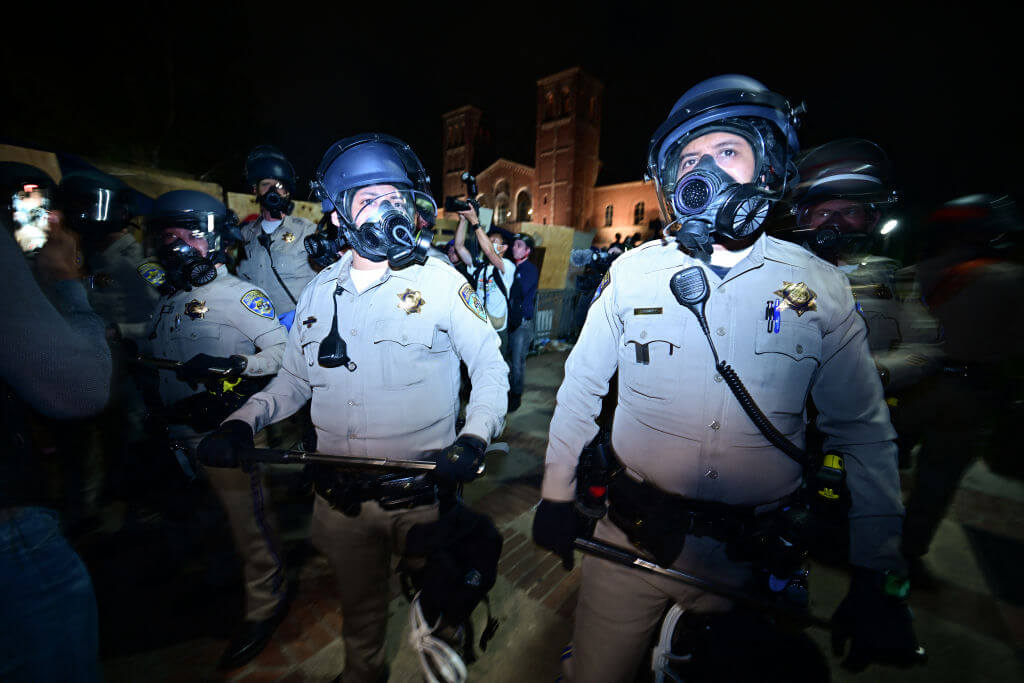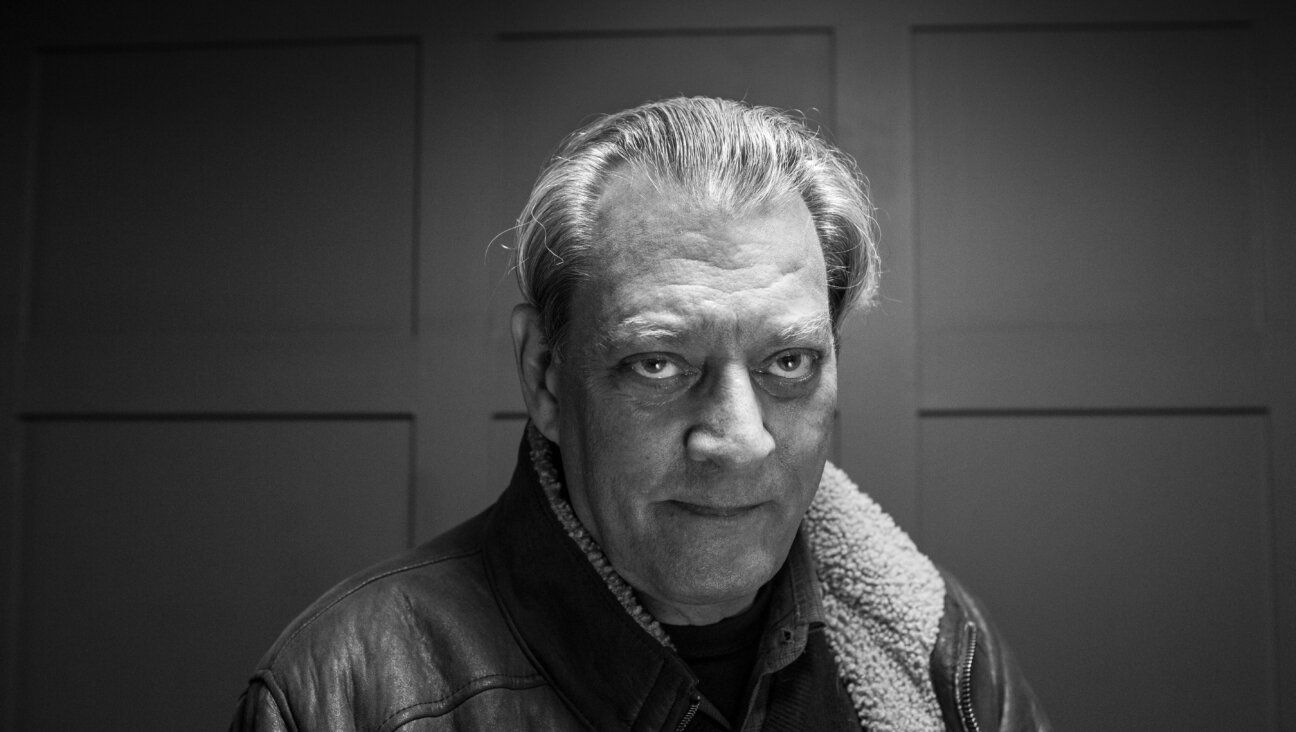Postpartum Depression Is Risky Business
It’s always fun when celebrities weigh in on sociopolitical matters. As Britney said on CNN, “We should trust our president in every decision that he makes, and we should just support that, you know, and be faithful in what happens.” Amen! Keep the faith! (But wait, does that mean you support our president’s faithful allies in the religious right, who would like you to put on some clothes?) And I respect Brad Pitt for wanting to use his powers of hotness for Good. He recently berated the media for discussing his private life instead of AIDS in Africa and debt relief for Third World countries. As he told ABC News’s “Primetime Live,” “It drives me mental.” (Hmm. Someone needs a little linguistic consciousness-raising session from the National Alliance for the Mentally Ill. If he can fit it in between important United Nations meetings with Angelina Jolie.)
Of course, it’s our own damn fault we have to hear Sheryl Crow natter on about the “huge karmic retributions” that will befall us over the war in Iraq. If we didn’t have a bottomless appetite for celebrity stories, we would be free to pay attention to more important things — like dryer lint. As long as we keep devouring Us Weekly magazine and delivering big ratings to any talk show that books Ben Affleck, we’ll be doomed to hear more treatises about values from people who are primarily famous for looking foxy, making out and pretending to use firearms while running in slow motion.
All of which is to say, it generally isn’t fair to attack celebrities for sounding like retards. (Oops. That made me sound like Brad Pitt. I mean, for sounding like morons.) But sometimes one particular star steps over the line. And Tom Cruise has not only stepped over the line, but also has obliterated it the way Xenu, the galactic overlord of Teegeeack, vaporized the frozen space aliens in the volcanoes of Hawaii. (I may not be a Scientologist, but I do have Internet access.)
Anyway, as you probably know, Tom seems to be off his meds lately. If Scientologists did meds, I mean. First he bounces around like a Spaldeen on Oprah’s couch, screeching his love for Katie Holmes, who is .6173 times his age. (You have no idea how hard I had to work for that line, since I am Math Barbie.) Cruise’s performance was weird and unhinged, but kind of refreshing; one rarely sees celebrities who seem actively deranged these days. But when he went off on Brooke Shields for using psychiatry and psychiatric drugs to combat her postpartum depression, that was de trop.
First, Tom told “Access Hollywood” that Brooke’s use of antidepressants was “irresponsible,” then he added, “I care about Brooke Shields because I think she is an incredibly talented woman, [but] look at where her career has gone.” (Kids, stay off drugs! Look what happened to poor Brooke, winning raves for her performance in the musical “Wonderful Town” on Broadway, then winning raves for her performance in the musical “Chicago” in London! Let that be a lesson to you!) The feisty, medicated, eyebrowishly gifted star responded, “Tom Cruise should stick to saving the world from aliens and let women experiencing postpartum depression decide what treatment options are best for them.” She then offered up an olive branch: “If he wants to see ‘Chicago,’ I’ve left him two tickets — one adult, one child.” Oooh, snap! Olive branch retracted! Tom re-attacked like a thetan invading the body of a WOG. In an appearance on NBC’s “Today” show, when Matt Lauer brought up the contretemps, Tom growled, “Matt, Matt, you don’t even — you’re glib. If you start talking about chemical imbalance, you have to evaluate and read the research papers on how they came up with these theories, Matt, okay? That’s what I’ve done.” He went on: “The antidepressant, all it does is mask the problem. There’s ways of vitamins and through exercise and various things…. Drugs aren’t the answer; these drugs are very dangerous!”
So is pontificating, alas. Brooke responded with an op-ed in The New York Times, discussing her PPD and her decision to out herself by writing a book about her experience. She noted dryly, “While Mr. Cruise says that Mr. Lauer and I do not ‘understand the history of psychiatry,’ I’m going to take a wild guess and say that Mr. Cruise has never suffered from postpartum depression.”
I haven’t either. But somehow I think I have more empathy than Tom. I may not have had PPD, but I have given birth. And that means I can see how easy it would be to go from the “baby blues” (the sadness and mood swings experienced by 60% to 80% of women in the first few weeks after giving birth) to full-blown depression. A couple of weeks after Josie was born, I was so exhausted, I was hallucinating. For a fleeting moment, I thought George Bush was talking directly to me from my television. (Come on, why would he want to do that? I can pronounce “nuclear.”) I thought the bathroom rug was inching across the floor like a giant hairy centipede. I cried so hard while watching “Artificial Intelligence: A.I.” — one of the worst films ever made — that I scared my fellow filmgoers. (The part where the mom dumps her android son in the forest? Waterworks.)
I felt terrified about how dependent the baby was. On me. And on my body. Breastfeeding, which I’d expected to be easy, turned out to be hugely challenging. For weeks, Josie had trouble latching. She’d scream with frustration and often wept herself unconscious, unfed. I felt like a huge failure. My husband didn’t understand how overwhelmed I felt, and kept nudging me to call the insurance company about a hospital billing error. At the time, even picking up the phone seemed as overwhelming as piloting a fighter aircraft with Maverick.
My friends helped me: Emily sent food; Daryl cleaned the apartment; Tara, who used to work at Prada, arranged Josie’s onesies, folding and organizing them so gorgeously that they looked like a museum installation. And slowly, I got into the rhythm of parenting and felt better.
But as many as one out of every 10 women experiences PPD, which, unlike the baby blues, doesn’t blow over quickly. It can last up to a year after a baby’s birth. Experts who are not Tom Cruise believe it’s caused by a swirl of biochemical, hormonal, environmental and psychological factors, perhaps triggered by hormone levels crashing after the baby is born.
Its impact is huge. Brooke Shields wrote that she considered jumping out the window, swallowing a bottle of pills or driving her car into a wall with her daughter strapped into her car seat.
And new research indicates that fathers can suffer a very similar malady. Untreated, such depression can have major effects on children’s emotional and behavioral development. A study led by Paul Ramchandani of Oxford University, published last month in the British medical journal The Lancet, looked at almost 13,000 couples and found that about 4% of men had male postnatal depression. At age 3 1/2, these men’s kids were more likely than other kids to experience worry, sadness, hyperactivity and behavioral problems. And little boys seemed to be more affected by their dads’ state than did little girls. (In women’s PPD, boys and girls suffer equally.)
When parents are depressed, their children hurt. It’s hard to argue that medication and therapy, which are the equivalent of putting on your own oxygen mask before putting on your child’s, are good for families. And yet people like Tom seem to feel that the response to depression should be: Buck up, little camper. Take a vitamin. Buy some Nike cross trainers. (You probably got some in the free gift bag from the “Mr. and Mrs. Smith” premiere. Oh wait, you weren’t invited? Sorry. My bad.)
It’s my fault as much as anyone’s that Tom gets a national forum to rant about other people’s flaws. I saw “Vanilla Sky.” I read In Style in the nail salon. So, Tom, I’ll make you a deal: I promise to ignore your narrow-minded lecturing to women about a disease you know nothing about if you promise not to make a sequel to “Cocktail.”
Write to Marjorie at [email protected].

I hope you appreciated this article. Before you go, I’d like to ask you to please support the Forward’s award-winning, nonprofit journalism during this critical time.
Now more than ever, American Jews need independent news they can trust, with reporting driven by truth, not ideology. We serve you, not any ideological agenda.
At a time when other newsrooms are closing or cutting back, the Forward has removed its paywall and invested additional resources to report on the ground from Israel and around the U.S. on the impact of the war, rising antisemitism and the protests on college campuses.
Readers like you make it all possible. Support our work by becoming a Forward Member and connect with our journalism and your community.
Make a gift of any size and become a Forward member today. You’ll support our mission to tell the American Jewish story fully and fairly.
— Rachel Fishman Feddersen, Publisher and CEO
Join our mission to tell the Jewish story fully and fairly.






















